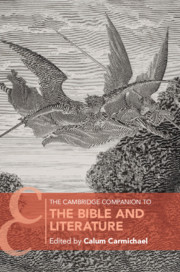Book contents
- The Cambridge Companion to the Bible and Literature
- Cambridge Companions to Religion
- The Cambridge Companion to the Bible and Literature
- Copyright page
- Contents
- Contributors
- Abbreviations
- Introduction
- 1 Literature in the Ancient Near East and the Bible
- 2 The Primary Narrative (Genesis through 2 Kings)
- 3 Reading Biblical Literature from a Legal and Political Perspective
- 4 Biblical Law and Literature
- 5 Kings, Prophets, and Judges
- 6 Prophetic Literature
- 7 Wisdom Literature
- 8 The Gospels
- 9 Paul’s Letters
- 10 Apocalyptic Literature
- 11 Shakespeare’s King Lear and the Bible
- 12 The Bible and John Milton’s Paradise Lost
- 13 The Bible, Shelley, and English Romanticism
- 14 Herman Melville and the Bible
- 15 The Song of Songs and Two Biblical Retellings
- Index
- Other Titles in the Series
Introduction
Published online by Cambridge University Press: 13 March 2020
- The Cambridge Companion to the Bible and Literature
- Cambridge Companions to Religion
- The Cambridge Companion to the Bible and Literature
- Copyright page
- Contents
- Contributors
- Abbreviations
- Introduction
- 1 Literature in the Ancient Near East and the Bible
- 2 The Primary Narrative (Genesis through 2 Kings)
- 3 Reading Biblical Literature from a Legal and Political Perspective
- 4 Biblical Law and Literature
- 5 Kings, Prophets, and Judges
- 6 Prophetic Literature
- 7 Wisdom Literature
- 8 The Gospels
- 9 Paul’s Letters
- 10 Apocalyptic Literature
- 11 Shakespeare’s King Lear and the Bible
- 12 The Bible and John Milton’s Paradise Lost
- 13 The Bible, Shelley, and English Romanticism
- 14 Herman Melville and the Bible
- 15 The Song of Songs and Two Biblical Retellings
- Index
- Other Titles in the Series
Summary
It is increasingly fashionable for interpreters of the Bible unfamiliar with the original languages and the relevant ancient history to pursue literary approaches. Even the legal material is commonly evaluated in literary terms. No scholarly effort is independent of fashion in the sense of a cultural trend and of idiosyncrasy in the sense of a personal bent. An often unspoken assumption is that because so much research into linguistic and historical backgrounds of the biblical texts has occurred down the centuries little scope is left to say much that is new. There is a measure of truth in this notion. Despite an abiding commitment among a coterie of German scholars, more often than not scholars pay but lip service to the longstanding historical-critical theory about the Graf-Wellhausen JEDP four source make-up of the Pentateuch. The approach’s long history illustrates the not infrequent phenomenon of a critical theory perpetuating itself even when its raison d’être has been lost sight of. It is, however, precisely a lack of confidence about uncovering new meaning in the original sources that provides a major impetus for this volume. The essays reflect the efforts of scholars who, by and large, not committing to old order ways, enable them to advance imaginative ones of looking at the Bible. The goal is to modify and reshape many preconceived notions about the contents of the Bible and also its role in selected areas of Western literature. Another aim is to stimulate further questioning on the part of the reader. There is good reason to do so. The German philosopher, Friedrich Schlegel, speaks of a classical work as one that cannot ever be fully understood, but those who are educated and who seek to enhance their education nevertheless through engagement with such a work learn more and more.
- Type
- Chapter
- Information
- Publisher: Cambridge University PressPrint publication year: 2020

